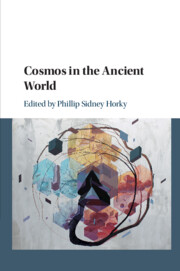Book contents
- Cosmos in the Ancient World
- Cosmos in the Ancient World
- Copyright page
- Dedication
- Epigraph
- Contents
- Contributors
- Acknowledgements
- An Historical Note on Kόσμος – Terminology
- Abbreviations
- Introduction
- Chapter 1 When Did Kosmos Become the Kosmos?
- Chapter 2 Ordering the Universe in Speech
- Chapter 3 Diakosmêsis
- Chapter 4 Aristotle on Kosmos and Kosmoi
- Chapter 5 Order and Orderliness
- Chapter 6 Polis as Kosmos in Plato’s Laws
- Chapter 7 Relating to the World, Encountering the Other
- Chapter 8 Tradition and Innovation in the Kosmos–Polis Analogy
- Chapter 9 Cosmic Choruses
- Chapter 10 All the World’s a Stage
- Chapter 11 The Architectural Representation of the Kosmos from Varro to Hadrian
- Chapter 12 “The Deep-Sticking Boundary Stone”
- Chapter 13 Cosmic Spiritualism among the Pythagoreans, Stoics, Jews and Early Christians
- Afterword
- Bibliography
- Index Locorum
- General Index
Chapter 9 - Cosmic Choruses
Metaphor and Performance
Published online by Cambridge University Press: 18 June 2019
- Cosmos in the Ancient World
- Cosmos in the Ancient World
- Copyright page
- Dedication
- Epigraph
- Contents
- Contributors
- Acknowledgements
- An Historical Note on Kόσμος – Terminology
- Abbreviations
- Introduction
- Chapter 1 When Did Kosmos Become the Kosmos?
- Chapter 2 Ordering the Universe in Speech
- Chapter 3 Diakosmêsis
- Chapter 4 Aristotle on Kosmos and Kosmoi
- Chapter 5 Order and Orderliness
- Chapter 6 Polis as Kosmos in Plato’s Laws
- Chapter 7 Relating to the World, Encountering the Other
- Chapter 8 Tradition and Innovation in the Kosmos–Polis Analogy
- Chapter 9 Cosmic Choruses
- Chapter 10 All the World’s a Stage
- Chapter 11 The Architectural Representation of the Kosmos from Varro to Hadrian
- Chapter 12 “The Deep-Sticking Boundary Stone”
- Chapter 13 Cosmic Spiritualism among the Pythagoreans, Stoics, Jews and Early Christians
- Afterword
- Bibliography
- Index Locorum
- General Index
Summary
In this chapter, Renaud Gagné pursues a chronologically wide-ranging study of how the motion of the heavenly bodies was thought about through the idea of choral dance. This chapter compares various unrelated, self-reflexive usages of the astral chorus metaphor in three genres of poetry and briefly considers how each illuminates the others. Instead of a teleological narrative, a dialogue of commonalities and contrasts is sought in the juxtaposition of comparable case studies. The striking image of the astral chorus was, among many other things, a powerful catalyst for thinking mimesis in action. A vision of the cosmic order is used in all three texts to reflect on the boundaries of poetic representation. The first text is a short epigram from Marcus Argentarius (AP 9.270 = G.-P. XXVI). The second passage is the ecphrasis of Dionysus’s shield in the Dionysica of Nonnus of Panopolis (25.380-572). The third text is another shield ecphrasis, that one from the first stasimon of Euripides’ Electra (432-486). The readings illustrate how a key figure of cosmic harmony was revisited to ponder the limits of poetic representation. Projecting itself on the cosmos, the idea of the choral dance could also reflect the cosmos back on song itself.
Keywords
- Type
- Chapter
- Information
- Cosmos in the Ancient World , pp. 188 - 211Publisher: Cambridge University PressPrint publication year: 2019
- 3
- Cited by

